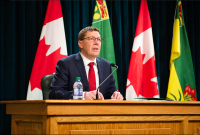After months of calls from advocates for a clearer picture of who is contracting COVID-19 and how it affects them, the Public Health Agency of Canada is still looking into the possibility of collecting more demographic data related to the disease.
Public health officials in the United States discovered weeks ago the deadly virus was disproportionately affecting black communities.
A more recent study released Tuesday by researchers at several American universities found counties in the U.S. with the highest proportions of black Americans represented more than half of all COVID-19 cases and 60 per cent of deaths in the country, despite making up only 22 per cent of counties.
(The study, led by the Foundation for AIDS Research and Emory University, has not been peer-reviewed.)
Advocates in Canada say the same situation is likely playing out here on a smaller scale, but the government isn't collecting the data to understand who is most at risk.
"There's a sense that if we were to collect socio-demographic data that includes things like race, ethnicity and income, we can get a better sense of what's actually happening," said Paul Bailey, president of the Black Health Alliance.
Black Canadians are more likely to have poor health outcomes related to several chronic diseases, and be impacted by socio-economic factors like poor access to food, housing, and employment than the general population, he said.
All those factors together put them at greater risk from COVID-19.
Armed with detailed data, Canada would be better equipped to respond and help the people most at risk, he said.
Currently Canada gathers only basic data about people who test positive for the disease, including age and gender.
"I think there's a number of gaps in that data," Canada's top public health officer Dr. Theresa Tam acknowledged at a briefing Wednesday.
She said efforts are underway to look at improving the situation, but her deputy, Dr. Howard Njoo said it has to be balanced against the workload.
"Everyone is stretched in terms of working under extreme circumstances," Njoo said.
The agency is still discussing what kind of data to prioritize, he said.
Those discussions are happening in concert with provinces and territories that are actually responsible for gathering the data from the respective health units.
That's difficult for Bailey to hear, several months into the Canadian outbreak.
"I think given the specific pandemic, we should be much more nimble and responsive and able to actually ensure that we're doing things effectively," Bailey said.
Some health units have already committed to gathering more detailed data, including Toronto's.
Though it does take work, Bailey said it doesn't seem particularly difficult to ask more questions when health-care workers admit patients to hospitals or do contact-tracing for positive cases.
This report by The Canadian Press was first published May 6, 2020.





Comments